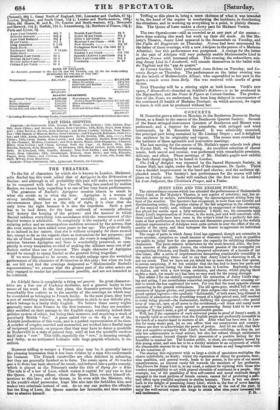THE THEATRES.
To the list of characters by which she is known in London, Mademoi- selle Rachel has this week added that of Agrippine in the Britannicus of Racine: and although in all probability this part will make no impression to be compared with that of her Camille, being less marked by sudden gashes, we cannot help regarding it as one of her very finest performances. The greatness of Rachel's Agrippine consists almost as much in what she avoids as in what she does. Agrippine is a woman of strong intellect, without a particle of morality; and even though circumstances place her on the side of right, it is clear that she only loves the right because it is also the expedient. Such a part has to be iced down, for the least outbreak of womanly affection will destroy the keeping of the picture: and the manner in which Rachel subdues everything into accordance with the temperament of this fearful woman is admirable. So completely is the maturity of a cold cal- culating policy and an unscrupulous ambition assumed by the actress, that she even seems to have added some years to her age. The pride of family is so imbued in her nature, that she is without sympathy for those around her, except so far as she regards them as instruments for her purposes; and the air of fixed haughtiness and contempt she wears is magnificent. The relation between Agrippina and Nero is wonderfully preserved, so com- pletely is every temptation avoided of making the alliance seem one of af- fection rather than one of interest. This single character of Agrippine would be enough to stamp Rachel as the greatest living tragedian. If we were disposed to be severe, we might enlarge upon the wretched performance of the character of Britannicus in this play: but when we look at our bill and find the evenings designated as "Mademoiselle Rachel's representations," we assume that the greater part of the other actors are only engaged to render her performances possible, and are not intended to be criticized.


























 Previous page
Previous page